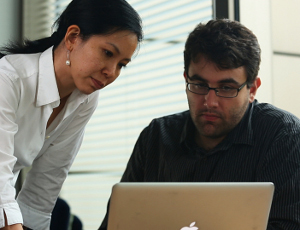Sanger Institute PhD student wins prestigious prize

The Basic Sciences Division of the Fred Hutchinson Cancer Research Centre in Seattle, US, awards the prize each year to celebrate outstanding achievement during graduate studies in the biological sciences. Dr Alexandrov, the only European recipient on this year’s list, will present his influential paper ‘Signatures of mutational processes in human cancer’, published in Nature, at the centre’s annual scientific symposium on 1 May 2015.
“The theoretical model and computational framework devised by Ludmil allowed him to provide the first-ever catalogue of the mutational processes operating in human cancer. Ludmil is a most deserving winner of this award and his remarkable achievements at such an early stage of his career leave me in no doubt that we will be hearing a lot more from him.”
Professor Mike Stratton Director of the Wellcome Trust Sanger Institute
Dr Alexandrov’s research, which was conducted under the supervision of Professor Stratton as part of the Cancer Genome Project, uncovered more than 20 different signatures of processes that mutate DNA and cause cancer. For many of the signatures, the research team also identified the underlying biological process responsible.
“The Sanger Institute PhD programme enables bright young people to lead cutting-edge research projects at a very early stage in their career, giving them the skills they need to become the scientific leaders of the future. The outstanding contribution that Ludmil has made to cancer research is very deserving of this prestigious accolade.”
Dr Carl Anderson Director of Graduate Studies, Sanger Institute
Earlier this year, Dr Alexandrov’s paper was highlighted by the American Society of Clinical Oncology as an important step forward in cancer research and, last year, Dr Alexandrov was selected as one of Forbes Magazine’s Top 30 Under 30. The list, published each January, selects the entrepreneurial, creative and intellectual best of their generation.
“I am really honoured that my graduate work has received such high recognition. My PhD studies at the Sanger Institute were an extremely exciting time for me and it was both a pleasure and an honour to work with Mike. From the beginning we could both see the potential of better understanding cancer’s causes and it was quite incredible that we were able to solve the puzzle in front of us.”
Dr Ludmil Alexandrov Former PhD student at the Wellcome Trust Sanger Institute and the University of Cambridge
Now an Oppenheimer Fellow at Los Alamos National Laboratory in New Mexico, US, Dr Alexandrov and Professor Stratton are continuing to collaborate on the cancer signatures project. Alongside the Pan Cancer initiative, they hope to analyse the mutational signatures of 20,000 patient samples to create a comprehensive map of mutational processes in cancer. Dr Alexandrov is also conducting research into the molecular processes that cause ageing.
More information
Publications:
Selected websites
The Sanger Institute PhD Programme
The Sanger Institute PhD programme aims to nurture the next generation of world-class genome biologists and clinicians. Each student is supervised by a member of the Sanger Institute’s Faculty and our students benefit from a supervisor from outside the Sanger Institute. The Sanger Institute is affiliated with the University of Cambridge as a ‘University Partner Institution’. All our graduate students are registered at the University.
The Harold M. Weintraub Graduate Student Award
The Harold M. Weintraub Graduate Student Award recognizes outstanding achievement during graduate studies in the biological sciences. The award, established in 2000, honours the late Harold M. Weintraub, Ph.D., a founding member of the Hutch’s Basic Sciences Division who in 1995 died from brain cancer at age 49. Weintraub was an international leader in the field of molecular biology; among his many contributions, he identified genes responsible for instructing cells to differentiate, or develop, into specific tissues such as muscle and bone.
Fred Hutch
Fred Hutch has been at the forefront of disease research since being founded in 1975. The Hutch was a vision of two brothers, Dr William Hutchinson, a Seattle surgeon, and Fred Hutchinson, a baseball hero. Our mission is the elimination of cancer and related diseases as causes of human suffering and death. Fred Hutch’s world-renowned faculty study the disease process from the molecular and cellular level and population-based approach to translate the knowledge into treatments that may lead to cures.
Los Alamos National Laboratory
Los Alamos National Laboratory is a premier national security research institution. The people of Los Alamos work on advanced technologies to provide the United States with the best scientific and engineering solutions to many of the nation’s most crucial challenges.
The Wellcome Trust Sanger Institute
The Wellcome Trust Sanger Institute is one of the world’s leading genome centres. Through its ability to conduct research at scale, it is able to engage in bold and long-term exploratory projects that are designed to influence and empower medical science globally. Institute research findings, generated through its own research programmes and through its leading role in international consortia, are being used to develop new diagnostics and treatments for human disease.
The Wellcome Trust
The Wellcome Trust is a global charitable foundation dedicated to achieving extraordinary improvements in human and animal health. We support the brightest minds in biomedical research and the medical humanities. Our breadth of support includes public engagement, education and the application of research to improve health. We are independent of both political and commercial interests.


